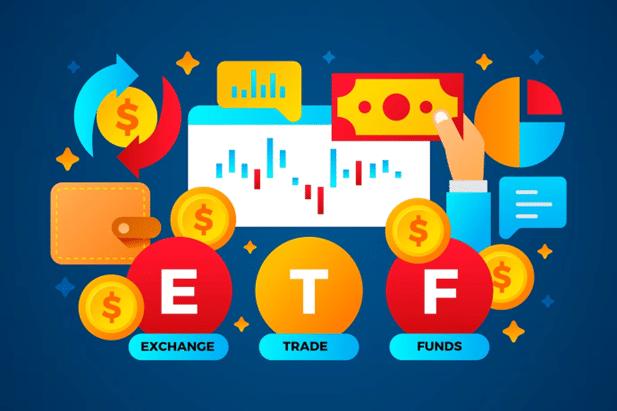Bitcoin ETFs have been the latest trend in the world of digital assets, and their rapid surge on the market might showcase a new era of crypto. These exchange-traded funds came at the perfect time for investors to lessen their risks and increase funds because they come at a lower cost and provide numerous tax benefits.
ETFs represent a bulk of assets that have their shares traded on a stock market ―which is why they seem to have similar characteristics and advantages to stocks or bonds. Bitcoin ETFs also have more benefits for investors because they ensure convenience and better prices since they’re not traded on crypto exchanges but are similar to these assets. At the same time, they simulate a crypto’s performance by enhancing their futures.
Investing in Bitcoin ETFs also allows users to purchase or sell the coin at a specific price and time, an aspect settled in the contract made beforehand. Overall, they’re great for portfolio diversification, and even if it took some time for the bubble to burst, the first Bitcoin spot ETF reached Europe recently.
How did the first Bitcoin ETF reach Europe?
The first Spot Bitcoin ETF was planned to be delivered in 2022, but it has been delayed due to SEC regulations and limits imposed on the crypto market. The ETF is now regulated by the Guernsey Financial Services Commission (GFSC).
Although the ETF penetrated the European ecosystem later, what’s most impressive is that it all happened before the US made a decision regarding ETFs. SEC continues to delay the decision to approve their listing. A recent article stated that the matter won’t be settled until early 2024, which keeps American investors waiting to get the same benefits as the rest of the world. The regulator is set to maintain its position against cryptocurrencies as leaders consider this tool as dangerous for the economy.
Why is the US so fixated on ETFs if they’re so advantageous for investors?
Major companies filed their applications regarding proposals for turning certain assets and products into ETFs. However, the SEC either rejected or ignored them repeatedly. Despite numerous requests, the regulator insists that such assets might be the subject of fraud and manipulation of the market due to its poor level of trading surveillance.
There’s also another reason why it takes so long for applications to be reviewed. SEC is proceeding in a leisurely fashion to check the organizations and their proposals for about 240 days. Since the regulator also has the ability to stretch their deadlines, they might not respect the time limit provided to the public, which is why it’s better to expect a decision to come later than it was announced.
Bitcoin spot ETFs vs trusts: which is better?
ETFs and trust seem to have similar features, especially since they don’t require investors to provide Bitcoin ownership. Still, they have different structures. Bitcoin trusts haven’t attracted any attention from SEC or other regulatory oversight, making them more accessible, despite being closed-end funds. However, their prices can deviate considerably from the representing asset and can’t be exchanged for Bitcoin. The supply of trust shares is also limited and can’t be changed in relation to demand.
On the other hand, ETFs are open-end funds in which shares can change depending on demand. Their prices are closely linked with Bitcoin’s, so they’re adjacent to the underlying asset. ETFs also make it possible for shares to be redeemed, offering investors a significant advantage in meeting demand requirements. ETFs are also regulated investment products, ensuring a higher level of customer security compared to trust funds, but they still have a long way to go until they’re entirely permitted.
Is investing in Bitcoin ETFs that great?
Although they’re still to be officially approved by the SEC, BTC ETFs can be bought through a specific exchange that allows users to invest without buying Bitcoin. A brokerage account is required since ETFs are acquired through online brokerages. Users can also use market or limit orders to purchase their ETFs, depending on the highest prices they’re willing to offer.
There are plenty of benefits to choosing BTC ETFs for portfolio diversification because they provide just the perfect amount of exposure to the Bitcoin price without dealing with the cryptocurrency’s risks. Therefore, users won’t have to own Bitcoin, use a wallet password to protect their funds or handle the investing process, making it easier to enter the market. At the same time, ETFs contain numerous securities, which is a massive benefit for a portfolio, and it’s also tax-efficient.
However, as ETF investments increase, so do management fees, which can become overwhelming at some point since there are also multiple holdings in the asset. Unfortunately, this affects the accuracy of the total price in accordance with Bitcoin’s value. Moreover, ETFs can’t be considered cryptocurrencies, which makes it impossible for them to be traded in exchanges like other currencies.
Finally, there are chances that Bitcoin will be regulated at some point in the future since it would impose a challenge to the Bitcoin blockchain because decentralization would be lost, along with all the characteristics of a digital asset.
Are there other alternatives to BTC ETFs?
Bitcoin ETFs provide various benefits, but the disadvantages might lead investors to other assets, such as Ether or Tether, which are less volatile and more reliable. Ethereum ETFs have also recently increased in popularity and are accessible on most crypto exchanges like Binance. Plus, these stocks can be bought on public exchanges. What’s best is that now there are around 8.754 ETFs worldwide, according to Statista, and their number is increasing every year, so despite challenges and regulations, ETFs have the potential to become the next thing on the market.
Final considerations
Amid regulatory difficulties and the SEC delaying ETF approval in the US, these assets entered the European market only after a year of postponement. Considering how important this is for the crypto market, we expect ETFs to reach the right audience and become a reliable alternative to current crypto assets.
DisClamier: This content is informational and should not be considered financial advice. The views expressed in this article may include the author's personal opinions and do not reflect The Crypto Basic opinion. Readers are encouraged to do thorough research before making any investment decisions. The Crypto Basic is not responsible for any financial losses.



